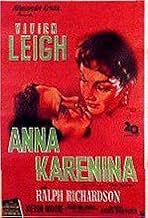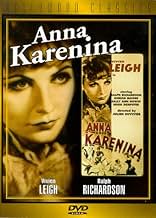IMDb RATING
6.6/10
3.1K
YOUR RATING
A married woman's affair with a dashing young officer has tragic results.A married woman's affair with a dashing young officer has tragic results.A married woman's affair with a dashing young officer has tragic results.
Niall MacGinnis
- Levin
- (as Niall Macginnis)
Featured reviews
While certainly the vanities and indiscretions of upper crust Russia is examined by Tolstoy and it has been some time since I have read the lengthy novel, this version is certainly more memorable and effective than the Garbo version. I do agree with an earlier review in that Garbo herself, perhaps a bit too self-possessed and headstrong, could never represent the character of Anna, a woman carried away on passion, lust and impending tragedy.
Vivien Leigh is stunning in her facial expressions and vulnerable, almost exotic appearance, as we see her in a black gown, contrasted dramatically with other women who blend in the background to obscurity. The gowns and architecture of the era, the stark coldness and added texture of snowflakes, as a bas-relief to the portrait of Anna. Her close-ups particularly as she is in the train station in winter, foreshadowing her eventual fate.
Overall a beautiful film which is well worth viewing. Leigh is beautiful and tragic. 8/10.
Vivien Leigh is stunning in her facial expressions and vulnerable, almost exotic appearance, as we see her in a black gown, contrasted dramatically with other women who blend in the background to obscurity. The gowns and architecture of the era, the stark coldness and added texture of snowflakes, as a bas-relief to the portrait of Anna. Her close-ups particularly as she is in the train station in winter, foreshadowing her eventual fate.
Overall a beautiful film which is well worth viewing. Leigh is beautiful and tragic. 8/10.
It has always struck me as a pity that whenever film versions of "Anna Karenina" are discussed it is Greta Garbo's of 1935 that excites critical attention rather than Vivien Leigh's. I suppose this is inevitable given that Garbo's is the more memorable performance, but in all other respects I find Julien Duvivier's 1948 version the finer film. It was the first one I saw and got to know really well, so much so that when I finally caught up with the Clarence Brown film I loathed it by comparison. It somehow epitomised the worst of M-G-M by being so studio bound and schmaltzy whereas Duvivier seemed to have made every effort to give his a feeling for 19th century Russian atmosphere. Andrej Andrejew's art direction had a real period sense of style and the music score by Constant Lambert with its echoes of "The Five" was a world away from the Herbert Stothart syrup. But by far the biggest plus of the 1948 version is the magisterial performance by Ralph Richardson as Karanin which stands beside his other two great roles of the same period, that of Dr Sloper in "The Heiress" and Baines the butler in "The Fallen Idol". His Karenin is not the arrogant brute of Basil Rathbone's (too close to his Murdstone in "David Copperfield" made in the same year) but a deceived husband evoking pity through his inability to be loved. Even Kieron Moore's rather colourless Vronsky scores over Frederic March's as it suggests the character's innate weakness rather than his romantic dash. If the Duvivier film has a serious flaw it is the rather prissy "upper class" delivery of dialogue by the female characters. Even Vivien Leigh's Anna suffers from this. I have a theory that the fault may lie in Duvivier as I have noticed repeatedly how directors whose native language is not English fail to control the nuances of speech when directing an English language film. Antonioni's "Blow Up" and the dialogue of Harvey Keitel in "Angelopoulos's "Ulysses Gaze" are examples. Interestingly the version recently shown on the British Carlton Films TV channel restored an additional 15 minutes to the version I had previously known, mainly early scenes that established minor characters with greater clarity. However the most significant restoration was a closing shot held considerably longer, thus giving that additional weight to the final tragedy that a really thoughtful director of Duvivier's calibre must have originally intended.
How can one possibly turn Tolstoy's novel into a "short" film? Even at 139 minutes in the uncut Korda version so much must be lost. What we end up, sad to say, is a first-rate melodrama without the psychological subtleties of the book. But that's the bad news. On the plus side, we have the sort of lavish the sky's-the-limit big, big, bigger budget production that only the Hungarian Alex Korda could have produced a few years after the world war on the sound stages of London --sets by the Russian Andreiev, costumes by the English Cecil Beaton; deep-focus photography and lighting by the French Henri Alekan ("Belle et Bete"), and music by the English composer Constant Lambert. Technically, this film contains some of the best B&W work ever done in Britian. Perhaps the greatest fault of the film is in the style of the acting. Vivian Leigh is a great beauty, very aristocratic, very British in her reserve, but when she falls in love with Vronsky she seems constitutionally incapable of the unbridled passion that Garbo brings to the role. Ralph Richardson, however, is perfect --far superior to Basil Rathbone. Richardson displays all the rigidity of Anna's husband; his enormous pride and wounded vanity; his total incapacity to understand his wife's heart. Needless to say, Kieron Moore as Vronsky tries very hard, looks wonderful in costumes, but he seems more a West-End juvenile than the great aristocrat and officer that Tolstoy depicts. Laurence Olivier would have been a perfect Vronsky. Why Korda chose not to cast him beside his wife is a mystery.
Rumor had it that Vivien Leigh was not anxious to take on the remake of "Anna Karenina" partly because she had just recovered from tuberculosis, and maybe also because the ghost of Greta Garbo was too real. But she had one film left to do for Alexander Korda, and this was it. "Anna Karenina" released in 1948, stars Leigh as the tragic Anna. The story is based on Tolstoy's novel. Anna meets a handsome colonel, Count Vronsky (Kieron Moore) and falls in love with him. The trouble is, she is married to a high-level Russian bureaucrat (Ralph Richardson) and has a son. Anna's husband is a self-absorbed politician type, somewhat cold and aloof, consumed with his image in Russian politics. He sees marriage as a "duty" something he says a few times. Anna runs away with Vronksy, a horrendous scandal at the time and probably still would be today. It all ends tragically. Comparisons between this film and the 1935 one are inevitable. While both films are respectable, I prefer Viven Leigh's performance of Anna. Perhaps it was because Leigh had her own personal demons that she made this part so amazingly real, as she would in "A Streetcar named Desire" three years later. While I admire Garbo, I did not think of her as a great actress. Too aloof in some ways to believe she would fall head over heels for Vronsky. Ralph Richardson plays his part with consummate discipline; he can only see Anna's betrayal in terms of how it effects him. Kieron Moore is harder to judge. In the first part of the movie, he isn't given much to do except show off his good looks. He does, however, get a few good scenes as the movie progresses, and plays Vronksy as a decent man but also a flawed one. If you only know the 1935 version of this film, at least be open-minded enough to give this remake a chance. For me, Viven Leigh was reason enough for me to see it.
There is very little to find fault with in this screen update of Tolstoy's classic story. Vivien Leigh is near perfection as the main character. What makes this film work is the way our tragic heroine is shown in relation to the elements that surround her: the scenes of train journeys in winter to and from Russia; and the warm weather and grandeur of a summer spent in Venice.
The supporting players are very effective and match Miss Leigh's talents in the most important scenes. The moment where Anna breaks in to see her son who has been told she died should not be missed. But the single greatest aspect of this film is the inner journey this character takes, as envisioned by Tolstoy. It is a harrowing confrontation of one's fate and delivered bravely as only this classic actress can.
The supporting players are very effective and match Miss Leigh's talents in the most important scenes. The moment where Anna breaks in to see her son who has been told she died should not be missed. But the single greatest aspect of this film is the inner journey this character takes, as envisioned by Tolstoy. It is a harrowing confrontation of one's fate and delivered bravely as only this classic actress can.
Did you know
- TriviaVivien Leigh's costumes were made in Paris by Barbara Karinska to Cecil Beaton's designs. She was in such pain wearing them that she even went to her doctor fearing she had broken her ribs. It was subsequently discovered that the dresser had been putting the corsets on upside down.
- Quotes
Anna Karenina: My dear Korsunsky, you know very well I never dance unless I can help it.
- Crazy creditsClosing credits: "And the light by which she had been reading the book of life, blazed up suddenly, illuminating those pages that had been dark, then flickered, grew dim, and went out forever".
- Alternate versionsU.S. release version runs approximately 112 minutes. This is the version issued by Fox DVD in 2007.
- ConnectionsFeatured in Vivien Leigh: Scarlett and Beyond (1990)
Details
- Release date
- Country of origin
- Official site
- Languages
- Also known as
- Anna Karenina
- Filming locations
- Monterey, California, USA(racetrack and steeplechase scenes)
- Production company
- See more company credits at IMDbPro
Box office
- Budget
- $2,000,000 (estimated)
- Runtime2 hours 19 minutes
- Color
- Aspect ratio
- 1.37 : 1
Contribute to this page
Suggest an edit or add missing content



































